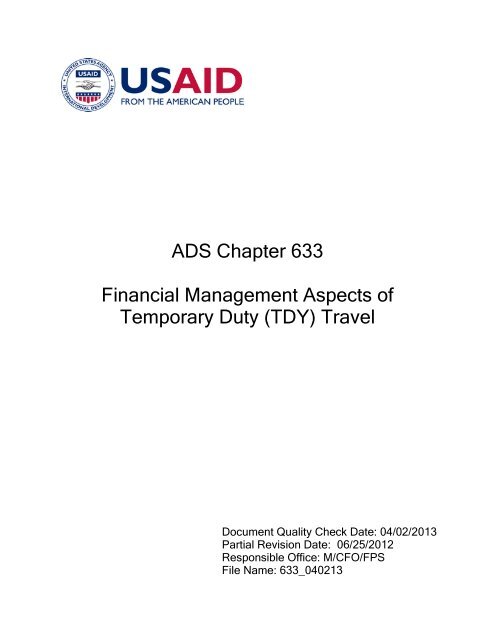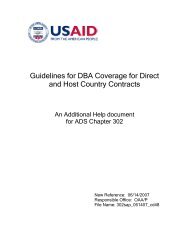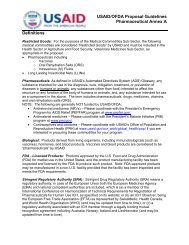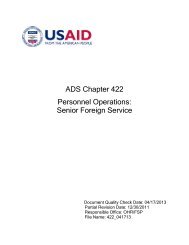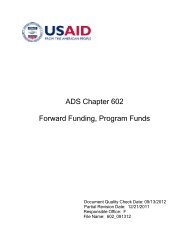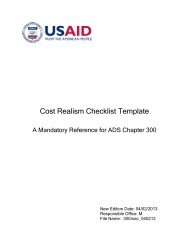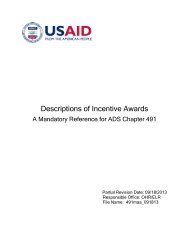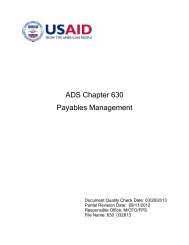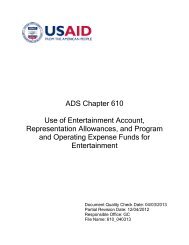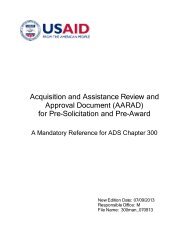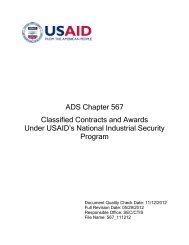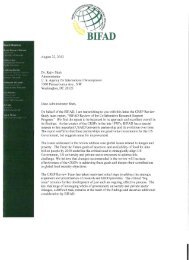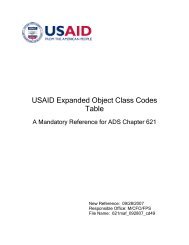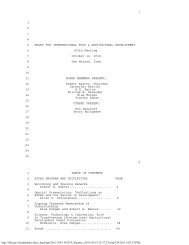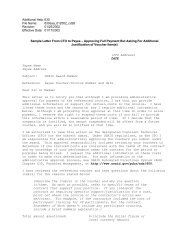ADS Chapter 633 Financial Management Aspects of ... - usaid
ADS Chapter 633 Financial Management Aspects of ... - usaid
ADS Chapter 633 Financial Management Aspects of ... - usaid
You also want an ePaper? Increase the reach of your titles
YUMPU automatically turns print PDFs into web optimized ePapers that Google loves.
<strong>ADS</strong> <strong>Chapter</strong> <strong>633</strong><strong>Financial</strong> <strong>Management</strong> <strong>Aspects</strong> <strong>of</strong>Temporary Duty (TDY) TravelDocument Quality Check Date: 04/02/2013Partial Revision Date: 06/25/2012Responsible Office: M/CFO/FPSFile Name: <strong>633</strong>_040213
06/25/2012 Partial RevisionFunctional Series 600–Budget and Finance<strong>ADS</strong> <strong>633</strong> – <strong>Financial</strong> <strong>Management</strong> <strong>Aspects</strong> <strong>of</strong> Temporary Duty (TDY) TravelPOC for <strong>ADS</strong> <strong>633</strong>: Patricia Wexel, (202) 567-5252, pwexel@<strong>usaid</strong>.govTable <strong>of</strong> Contents<strong>633</strong>.1 OVERVIEW .............................................................................. 4<strong>633</strong>.2 PRIMARY RESPONSIBILITIES ............................................... 4<strong>633</strong>.3 POLICY DIRECTIVES AND REQUIRED PROCEDURES ........ 5<strong>633</strong>.3.1 <strong>Financial</strong> Documentation Responsibilities ............................................ 5<strong>633</strong>.3.2 Travel Advances ...................................................................................... 6<strong>633</strong>.3.3 Government-Sponsored Travel Card ..................................................... 7<strong>633</strong>.3.4 Personal Liability for the Government-Sponsored Travel Card .......... 8<strong>633</strong>.3.4.1 Payment <strong>of</strong> Charge Card Bills .................................................................... 8<strong>633</strong>.3.4.2 Delinquent Payment, Charge Card Suspension and Cancellation ............. 8<strong>633</strong>.3.5 Travel Voucher Processing Requirements .......................................... 11<strong>633</strong>.3.5.1 Lodging-Plus Per Diem Method ............................................................... 12<strong>633</strong>.3.5.2 Actual Expense Method ........................................................................... 12<strong>633</strong>.3.6 Miscellaneous Expenses ....................................................................... 13<strong>633</strong>.3.6.1 Telephone Calls ....................................................................................... 13<strong>633</strong>.3.6.2 State and Local Lodging Taxes ............................................................... 14<strong>633</strong>.3.6.3 Laundry and Dry Cleaning Expense ........................................................ 14<strong>633</strong>.3.6.4 Other Miscellaneous Expenses ............................................................... 14<strong>633</strong>.3.6.5 Items Included in Per Diem Computation ................................................. 15<strong>633</strong>.3.7 New Per Diem Areas .............................................................................. 15<strong>633</strong>.3.8 Local Travel ............................................................................................ 16<strong>633</strong>.3.10 Outside Funding Sources ..................................................................... 17<strong>633</strong>.4 MANDATORY REFERENCES ............................................... 21<strong>633</strong>.4.1 External Mandatory References ........................................................... 21<strong>633</strong>.4.2 Internal Mandatory References ............................................................ 21Text highlighted in yellow indicates that the adjacent material is new or substantively revised. 2<strong>ADS</strong> <strong>Chapter</strong> <strong>633</strong>
06/25/2012 Partial Revision<strong>633</strong>.4.3 Mandatory Forms ................................................................................... 22<strong>633</strong>.5 ADDITIONAL HELP ............................................................... 22<strong>633</strong>.6 DEFINITIONS ......................................................................... 22Text highlighted in yellow indicates that the adjacent material is new or substantively revised.<strong>ADS</strong> <strong>Chapter</strong> <strong>633</strong>3
06/25/2012 Partial Revision<strong>ADS</strong> <strong>633</strong>–<strong>Financial</strong> <strong>Management</strong> <strong>Aspects</strong> <strong>of</strong> Temporary Duty (TDY) Travel<strong>633</strong>.1 OVERVIEWEffective Date: 09/21/1998This chapter establishes financial management requirements that govern all temporaryduty (TDY) travel and transportation performed within USAID.<strong>ADS</strong> 522, Performance <strong>of</strong> Temporary Duty Travel in the U.S. and Abroad, providesthe policy directives and required procedures concerning TDY travel; however, it doesnot address the financial management aspects <strong>of</strong> TDY travel and transportation.This chapter provides the financial management policy directives and requiredprocedures <strong>of</strong> travel, including, but not limited to:Travel advances,Government-Sponsored Travel Card,Completion and payment <strong>of</strong> travel vouchers and local vouchers, andAudit <strong>of</strong> travel vouchers.These policy directives and required procedures are based on the maximum use <strong>of</strong>automated electronic travel s<strong>of</strong>tware.<strong>633</strong>.2 PRIMARY RESPONSIBILITIESEffective Date: 09/21/1998a. The Chief, Bureau for <strong>Management</strong>, Office <strong>of</strong> the Chief <strong>Financial</strong>Officer, <strong>Financial</strong> Policy and Support Division (M/CFO/FPS) develops and publishespolicy directives and required procedures to administer the financial aspects <strong>of</strong> USAIDtemporary duty (TDY) travel and transportation. These policy directives and requiredprocedures are coordinated with the Bureau for <strong>Management</strong>, Office <strong>of</strong> AdministrativeServices, Travel and Transportation Division (M/MS/TTD).b. The Chief, Bureau for <strong>Management</strong>, Office <strong>of</strong> <strong>Management</strong> Services,Travel and Transportation Division (M/MS/TTD) develops and publishes policydirectives and required procedures and administers and coordinates the travel andtransportation activities <strong>of</strong> the Agency.c. The Chief, Bureau for <strong>Management</strong>, Chief <strong>Financial</strong> Officer, Office <strong>of</strong> Cash<strong>Management</strong> and Payments Division (M/CFO/CMP) processes approvedUSAID/Washington (USAID/W) requests for Travel Advances and payment <strong>of</strong> TDYvouchers.Text highlighted in yellow indicates that the adjacent material is new or substantively revised.<strong>ADS</strong> <strong>Chapter</strong> <strong>633</strong>4
06/25/2012 Partial Revisiond. The Office <strong>of</strong> General Counsel, Ethics Advisor (GC/EA) reviews and clears alloutside funded travel as documented by clearing the Travel Authorization (TA) forUSAID/W and for Missions when the Regional Legal Advisor (RLA) is not available.e. The Bureau for <strong>Management</strong>, Office <strong>of</strong> the Chief <strong>Financial</strong> Officer, TheDeputy Chief <strong>Financial</strong> Officer for Overseas Operations (M/CFO/DCFO)approves policy directives and required procedures on the financial aspects<strong>of</strong> all USAID TDY travel and transportation developed by the Bureaufor <strong>Management</strong>, Chief <strong>Financial</strong> Officer, <strong>Financial</strong> Policy and Support Division(M/CFO/FPS).f. The Mission Controller administers the financial aspects <strong>of</strong> Mission fundedtravel.g. The Regional Legal Advisor (RLA) reviews and clears all outside funded travelfor respective Missions. The RLA documents the clearance on the TA.h. The Traveler, upon completion <strong>of</strong> travel, must submit a completed expensereport (voucher/claim) to account for his or her travel and the related authorized costs.i. The Approving Official administratively approves a voucher claimingreimbursement <strong>of</strong> travel expenses before it is presented for certification by the certifying<strong>of</strong>ficer.j. The Travel Card Program Coordinator accepts, approves, and coordinatesapplications for the Government Sponsored Travel Card.<strong>633</strong>.3 POLICY DIRECTIVES AND REQUIRED PROCEDURES<strong>633</strong>.3.1 <strong>Financial</strong> Documentation ResponsibilitiesEffective Date: 08/12/2008<strong>Financial</strong> documentation is any documentation that impacts on or results in financialactivity. It includes any source material causing or resulting in a financial transactionand is not limited to documentation within Controllers’ or Chief <strong>Financial</strong> Officer (CFO)operations. Contracting Officer’s Technical Representative (COTRs), Loans/GrantsOfficers, Development Objective Teams (DOTs), etc., are responsible for retainingfinancial documentation and ensuring its availability for audit.Basic financial documentation retention rules follow:If an action will result in a financial transaction, it must be documented.Source documentation must be readily available for audit (by either theOffice <strong>of</strong> Inspector General (OIG) or a responsible audit entity),Retention must be referred to by document type in <strong>ADS</strong> 502, The USAIDRecords <strong>Management</strong> Program.Text highlighted in yellow indicates that the adjacent material is new or substantively revised.<strong>ADS</strong> <strong>Chapter</strong> <strong>633</strong>5
06/25/2012 Partial RevisionThe specific financial Records Disposition Schedules are located in the mandatoryreference section <strong>of</strong> <strong>ADS</strong> 502 under Records Disposition Schedule, USAID/Washington(USAID/W), <strong>Chapter</strong> 15, Fiscal <strong>Management</strong> Records and Records DispositionSchedule, USAID, <strong>Chapter</strong> 35, <strong>Financial</strong> <strong>Management</strong> Records. See also the NationalArchives and Records Administration (NARA) General Records Schedules (GRS)6, Accountable Officers’ Account Records and GRS 7, Expenditure AccountingRecords.<strong>633</strong>.3.2 Travel AdvancesEffective Date: 08/12/2008Travelers must not receive travel advances, except under special circumstances whichare approved on a case-by-case basis.USAID approves travel advances only for locations where the Government-SponsoredTravel Card (GSTC) is not accepted and cash or traveler’s checks are required.a. USAID/WThe Chief, Bureau for <strong>Management</strong>, Chief <strong>Financial</strong> Officer, Cash <strong>Management</strong> andPayments Division (M/CFO/CMP) approves USAID funded travel advances.USAID accepts applications for travel advances no more than 10 days prior to the start<strong>of</strong> travel. M/CFO/CMP requires at least 72 hours to process a travel advance. USAIDmakes travel advances via electronic payment to the traveler's bank account.As an option, employees may use their GSTC to obtain travel advances immediatelyprior to the start <strong>of</strong> <strong>of</strong>ficial government sponsored travel or while on <strong>of</strong>ficial travel. Theemployee may use their GSTC at any automatic teller machines (ATMs) or banksdisplaying the VISA logo to obtain cash advances to pay expenses associated with theapproved <strong>of</strong>ficial travel purposes only. Travelers requiring cash can use this serviceimmediately before departing on temporary duty (TDY).For travel to countries where the GSTC card is not usually accepted, the traveler shouldobtain the necessary amounts <strong>of</strong> money in traveler’s checks prior to travel. Thetraveler's GSTC may be charged for the amount <strong>of</strong> the checks. USAID does notconsider the issued traveler’s checks and/or cash obtained from ATMs or banks astravel advances. Traveler’s checks are not listed as advances on the travel voucher.Employees may claim the fees for obtaining travelers checks and funds from an ATM onthe travel voucher under Miscellaneous Expenses.USAID reserves the Agency imprest fund cashier for use in emergency situationsrequiring immediate funding only.b. OverseasText highlighted in yellow indicates that the adjacent material is new or substantively revised.<strong>ADS</strong> <strong>Chapter</strong> <strong>633</strong>6
06/25/2012 Partial RevisionThe Controller or the locally designated authority, usually the Executive Officer (EXO) orUSAID Mission Director when there is no Controller, approves payment <strong>of</strong> a USAIDfunded travel advance.USAID requires Missions to develop their own procedures for travel advances.<strong>633</strong>.3.3 Government-Sponsored Travel CardEffective Date: 10/01/2010The GSTC is issued to employees for <strong>of</strong>ficial Agency travel purposes under the contractprovisions contained in the GSA SmartPay contract through Citibank. The CitibankGSTC is issued to individual employees pursuant to the rules and requirements found inthe Citibank cardholder account agreement (see Agency Sponsored Travel Card). AllU.S. direct-hire (USDH) employees and personal service contractors (PSC) that arerequired to travel on <strong>of</strong>ficial Agency business must have the GSTC.a. Authorized Travel. Public Law 105-264, dated October 19, 1998, requires themandatory use <strong>of</strong> the GSTC for <strong>of</strong>ficial government travel by employees. There are norestrictions on issuing the GSTC to any USAID employee that is required to travel on<strong>of</strong>ficial Agency business.Employees that are considered infrequent travelers, only having one travel event peryear, are not required to have a GSTC. This does not exclude them from having a card.Travelers must use their GSTC to pay for lodging, meals, rental vehicles, excessbaggage, and other related travel expenses that have been authorized under their travelauthorization (TA). If the GSTC is not used for these expenses during travel, the travelermust explain in the comments section <strong>of</strong> their travel voucher why the GSTC was notused.b. How to Apply. The process for applying for the GSTC may be found on theCFO Web site, http://inside.<strong>usaid</strong>.gov/M/CFO/Travel_Card.htm, or from the APC inUSAID/W by sending an e-mail message to the USAID Travel Card mailbox at<strong>usaid</strong>travelcard@<strong>usaid</strong>.gov.Upon separation from the Agency, employees and PSCs must return their GSTC to theAPC and close their GSTC account. The APC is responsible for taking action to closethe account.c. Personal Use. Any personal use <strong>of</strong> the GSTC is strictly prohibited. Employeesmust not use the GSTC for any transaction that is not associated with their approvedTA. Employees may use the GSTC only for <strong>of</strong>ficial travel-related transactions.Employees must not use the GSTC for any transaction that is not associated with theirapproved TA. USAID staff on extended TDYs, 30 days or more, should submit interimvouchers for reimbursement at least every 30 calendar days and make arrangements toText highlighted in yellow indicates that the adjacent material is new or substantively revised.<strong>ADS</strong> <strong>Chapter</strong> <strong>633</strong>7
06/25/2012 Partial Revisionpay their GSTC Citibank bill, just as they would make arrangements to pay any otherbills while away from home.d. Hazardous Locations. USAID staff should not use their GSTC in locationswhere the post has issued a warning <strong>of</strong> credit card fraud. USAID encouragesemployees traveling from Washington to such locations to purchase travelers checksusing their GSTC. By doing so, they avoid the credit card fraud risk and at the sametime comply with policy. Employees traveling from field locations to these locations mayrequest a travel advance from their paying <strong>of</strong>fice instead <strong>of</strong> using the GSTC.<strong>633</strong>.3.4 Personal Liability for the Government-Sponsored Travel CardEffective Date: 08/12/2008The GSTC is issued in the name <strong>of</strong> the employee, not the Federal government. Thecardholder is responsible for the payment <strong>of</strong> all charges against the card. Any accountthat becomes delinquent is subject to the suspension and/or cancellation provisions <strong>of</strong>the appropriate GSTC Contract and Cardholders Account Agreement.<strong>633</strong>.3.4.1 Payment <strong>of</strong> Charge Card BillsEffective Date: 08/12/2008As part <strong>of</strong> the government Contract and Cardholder Account Agreement, full payment isdue monthly and deferred payments are not allowed. Payment <strong>of</strong> charges to individualGSTC accounts is due 30 days from the billing statement date. After 30 days, thecharges become delinquent and are subject to the suspension and/or cancellationprovisions <strong>of</strong> the appropriate GSTC contract.Employees on extended travel are expected to continue to make payments on time, or ifnecessary, make alternative payment arrangements with the card issuer.To make the necessary alternative arrangements, contact CitiBank at (800) 790-7206 or(904) 954-7850 from outside the U.S.<strong>633</strong>.3.4.2 Delinquent Payment, Charge Card Suspension and CancellationEffective Date: 08/12/2008The GSTC can be suspended or canceled for serious delinquency or misuse.On a monthly basis, the APC will randomly review transaction activity for the GSTC;checking for improper use and delinquencies. Use <strong>of</strong> the GSTC for non-travel activitiesor use while not on approved scheduled travel, excluding expenses incurred inconnection with the approved travel incurred immediately prior to the travel, will because for further investigation <strong>of</strong> possible abuse. The APC may contact delinquent cardholders to clarify cause <strong>of</strong> delinquency and advise <strong>of</strong> possible card suspension ifText highlighted in yellow indicates that the adjacent material is new or substantively revised.<strong>ADS</strong> <strong>Chapter</strong> <strong>633</strong>8
06/25/2012 Partial Revisionappropriate action is not initiated by the cardholder. In addition, serious abuse <strong>of</strong> thecard may result in disciplinary action.Charges that remain unpaid past the payment grace period may result in suspension <strong>of</strong>the GSTC unless the employee makes special provisions with the GSTC contractor.For more information about providing information to the contractor when extended travelcould result in late payment, see <strong>633</strong>.3.4.1, Payment <strong>of</strong> Charge Card Bills.NOTE: The policy directives and required procedures in this section are based onexisting General Services Administration (GSA) SmartPay2 contract specifications.They may be changed at anytime as a result <strong>of</strong> contract modifications or termination/rebid<strong>of</strong> the existing GSA scheduled providers.a. SuspensionThe contractor may initiate suspension action for the following:Late payment after 45 calendar days from the statement closing date inwhich the charge initially appeared,Immediately upon notifying the APC <strong>of</strong> misuse. As part <strong>of</strong> the presuspension/pre-cancellationaction, the unpaid, undisputed amount mustfirst be reported to the APC.The contractor may initiate any suspension action within the 45 to 61 calendar dayperiod after the undisputed charge initially appears in the billing statement.The contractor must notInitiate suspension action on disputed charges,Provide credit information on suspended accounts to credit bureaus, andRefer suspended accounts to collection bureaus for collection.The contractor may automatically reinstate suspended accounts upon payment <strong>of</strong> theundisputed principal amount, unless otherwise specified by the APC.To initiate the suspension process, the Citibank contractor must provide a presuspension/pre-cancellationlist to the APC citing the overdue accounts and amounts. Ifthe Citibank contractor does not receive payment for the undisputed principal within 55calendar days from the closing date <strong>of</strong> the statement in which the charge initiallyappears; suspension action may begin. Under these circumstances, the contractormust notify the individual cardholder and the APC <strong>of</strong> possible suspension action. Thenotification must inform the individual card holder that payment must be received withinfive business days in order to avoid suspension. If the contractor does not receivepayment by the end <strong>of</strong> the 61 st calendar day, the contractor may suspend the accountunless otherwise directed by the APC.Text highlighted in yellow indicates that the adjacent material is new or substantively revised.<strong>ADS</strong> <strong>Chapter</strong> <strong>633</strong>9
06/25/2012 Partial RevisionThe APC has the right to suspend an account if the APC documents and provides thereason for the suspension to the cardholder.NOTE: Suspension policy is based on the contract provisions <strong>of</strong> the GSA SmartPay2master contract.b. CancellationThe contractor must not initiate any cancellations until the end <strong>of</strong> the 120-calendar dayperiod after the undisputed charge initially appears in the billing statement.There are four reasons that may cause the contractor to cancel the GSTC:The account was suspended twice during the preceding 12-month periodfor late payment <strong>of</strong> undisputed accounts, and a third delinquency occurs.At that time, a letter will be sent to the travel account holder giving theindividual 10 calendar days to make full payment or the account will becancelled.The past due, undisputed amount is 120 calendar days past the closingdate on the statement in which the charge first appears and thesuspension requirements have been met.The cardholder made unauthorized purchases and cancellation isapproved by the APC. Unauthorized use is defined as using the GSTC forpersonal/non-<strong>of</strong>ficial purposes (for example, charges not authorized aspart <strong>of</strong> <strong>of</strong>ficial travel).The cardholder presented two or more nonsufficient funds (NSF) checkswithin a 12-month period.As part <strong>of</strong> the cancellation process, at 121 calendar days past due for undisputedamounts, the contractor has the option toCharge late fees on canceled accounts when issuing the statement <strong>of</strong>account;Provide credit information on canceled accounts to credit bureaus; andRefer canceled accounts to collection bureaus for collection.To initiate the cancellation process, the contractor must provide a pre-suspension/precancellationlist to the APC citing the overdue accounts and amounts <strong>of</strong> undisputedprincipal. Then, the contractor must notify the cardholder and APC <strong>of</strong> the cancellation ifpayment is not received by the close <strong>of</strong> business on the fifth calendar day after thenotification. The notice must include the contractor's point <strong>of</strong> contact for resolving thepast due amounts. If payment is not received by the end <strong>of</strong> the 61st day from theclosing date <strong>of</strong> the statement in which the charge first appeared, the contractor maycancel the account unless otherwise directed by the APC.Text highlighted in yellow indicates that the adjacent material is new or substantively revised.<strong>ADS</strong> <strong>Chapter</strong> <strong>633</strong>10
06/25/2012 Partial RevisionThe APC has the right to cancel an account if the APC documents and provides thereason for the suspension to the cardholder.<strong>633</strong>.3.5 Travel Voucher Processing RequirementsEffective Date: 06/25/2012The traveler must submit a travel voucher within five business days <strong>of</strong> the completion <strong>of</strong>a trip or every 30 calendar days if the traveler is in continuous travel status (FTR 301-52.7). Travel vouchers for TDY travel must be prepared in E2 Travel Solutions unlessthe individual or mission does not have Internet access or the travel authorization wasprepared outside <strong>of</strong> E2 because internet access was unavailable at the time. Vouchersprepared outside <strong>of</strong> E2 Travel Solutions must be submitted to the applicable payment<strong>of</strong>fice which is (1) the Office <strong>of</strong> the CFO, Cash <strong>Management</strong> and Payment Division(M/CFO/CMP) for Washington and (2) the individual USAID Cognizant <strong>Financial</strong><strong>Management</strong> (FM) <strong>of</strong>fice for the particular employee’s duty station or the responsibleoperating unit overseas.For same day travel, less than 12 hours in duration, per diem is not paid. Onlytransportation related expenses are reimbursed. (See <strong>633</strong>.3.8, Local Travel) The perdiem must be calculated in one <strong>of</strong> two ways as dictated by the TA for the trip, unless theTA authorized a combination <strong>of</strong> the two methods:Lodging plus per diem, orActual expense.For the first and last days <strong>of</strong> travel, USAID will pay three-fourths <strong>of</strong> the standard Mealsand Incidental Expenses (M&IE), regardless <strong>of</strong> the actual times <strong>of</strong> arrival and departure.This applies to the two methods <strong>of</strong> calculating per diem.Travelers must use the Agency's automated E2 Travel Solutions where available. Theelectronic travel system is a Web-based end-to-end travel processing application. Thevendor is managed under a GSA contract to provide common government-widestandards for financial travel transactions in compliance with GSA Federal TravelRegulations. The application provides for electronic routing and approval. Electronicsignature approval is certified through the unique E2 logon ID and password, and theuser roles assigned to authorized user groups.NOTE: If an employee gives (or makes known) their electronic signature, for examplelogon credentials, to another, the original employee is responsible for its use.This applies to USAID direct-hire employees and to USAID's Personal ServicesContractors (PSC) (US, Third Country National (TCN), and Foreign Service National(FSN)) in accordance with the terms <strong>of</strong> their contracts. It does not apply directly to othercontractors and their employees or grant/cooperative agreement recipients and theiremployees. The terms and conditions <strong>of</strong> their awards govern the per diemreimbursement policy for these individuals. For employees <strong>of</strong> other U.S. Governmentagencies working for USAID, the terms <strong>of</strong> the interagency agreement (through aText highlighted in yellow indicates that the adjacent material is new or substantively revised.<strong>ADS</strong> <strong>Chapter</strong> <strong>633</strong>11
06/25/2012 Partial RevisionParticipating Agency Service Agreement (PASA) or Participating Agency ProgramAgreement (PAPA)) determine the appropriate policy.If properly authorized, TAs issued before July 1, 2009 with travel commencing after July1, may be reimbursed using the all-inclusive method. The Federal Travel Regulation(FTR) (see FTR 301-11) does not permit the all-inclusive method <strong>of</strong> per diemreimbursement. The authority to use the all-inclusive reimbursement method has beenbased on a waiver from the General Services Administration (GSA), originally providedin 1996 and extended in 1999. During the interim, the waiver allowed USAID toimplement an electronic processing and routing system for travel documents. Thatsystem is E2 Travel Solutions (E2). Once E2 is available to the entire Agency, the basisfor the GSA waiver no longer applies. Therefore, TAs issued after June 30 must notauthorize reimbursement via the all-inclusive method.If available, all travelers must use the E2 Travel Solutions to complete their vouchers tothe extent possible. This ensures more timely and accurate filing.The approving <strong>of</strong>ficial(s) must complete administrative approval action within twobusiness days <strong>of</strong> the traveler sending the voucher. The approving <strong>of</strong>ficial(s) must haverequisite personal knowledge that the travel was undertaken as claimed by the traveler.The signature <strong>of</strong> the approving <strong>of</strong>ficial signifies that the claimed items are authorizedand approved; it does not indicate that the approving <strong>of</strong>ficer has examined eachindividual item in the voucher for legality or availability <strong>of</strong> funds.<strong>633</strong>.3.5.1 Lodging-Plus Per Diem MethodEffective Date: 08/12/2008The per diem allowance for each travel day is the actual amount the traveler pays forlodgings plus an allowance for M&IE. The per diem is calculated by adding actuallodgings, up to the allowed maximum amount authorized, plus the M&IE allowance.The traveler must declare any free meals paid for by a sponsor (for example, mealsprovided at conferences and training events). The corresponding M&IE equivalent mustbe adjusted for any gratuitous provisions, such as meals when claimed on the travelvoucher. The GSA M&IE rates can be viewed on the GSA Web site. (See GSA M&IE)The total allowance must not exceed the applicable maximum per diem rate for thespecified location. The M&IE rate, or fraction there<strong>of</strong>, is payable to the traveler withoutitemization <strong>of</strong> expenses or receipts.USAID requires that receipts be attached to the travel voucher for lodging and anyindividual expense over $75.00, including telephone calls.<strong>633</strong>.3.5.2 Actual Expense MethodEffective Date: 09/21/1998The actual expense method may be used ifText highlighted in yellow indicates that the adjacent material is new or substantively revised.<strong>ADS</strong> <strong>Chapter</strong> <strong>633</strong>12
06/25/2012 Partial RevisionThe maximum per diem rate is insufficient for a particular travelassignment because the actual and necessary subsistence expenses areunusually high,Affordable lodging accommodations are not available under the allowablelodging rate, orAffordable lodging accommodations cannot be obtained within areasonable commuting distance <strong>of</strong> the employee's TDY location.If lodging is not available at the traveler’s TDY location, USAID may authorize andapprove the maximum per diem rate for the location where lodging is obtained.Travelers must not exceed the applicable lodging or M&IE allowance by 300 percent <strong>of</strong>the actual allowable expenses. USAID requires that receipts be attached to the travelvoucher for lodgings and any expense, except meals, over $75.00; including telephonecalls. When actual expense per diem is authorized for the M&IE portion, all associatedexpenses must be itemized on the voucher, but receipts are not required.<strong>633</strong>.3.6 Miscellaneous ExpensesEffective Date: 09/21/1998In the development <strong>of</strong> the per diem rate, various miscellaneous elements were pricedand included in the rate determination. The Federal government recognized that inaddition to claiming reimbursement for lodgings and M&IE, other specific miscellaneousitems may be claimed over and above the calculated per diem rate shown under allthree methods <strong>of</strong> per diem calculation mentioned in section <strong>633</strong>.3.5. The employeemust list these items separately on the voucher, and receipts are required if there ismore than $75.00 in cost for any single item. (See 14 FAM 560)In preparing TAs for both overseas travel and travel within the continental United States(CONUS), the E2 travel arranger must include funds needed to cover thesemiscellaneous expenses. Under-funded TAs will delay reimbursement to the traveleruntil the TA is amended to adequately increase funds.<strong>633</strong>.3.6.1 Telephone CallsEffective Date: 09/21/1998Personal telephone calls when on TDY travel must be claimed and reimbursed on atravel voucher if (see 549.3.3b):It is a call home from any location worldwide to notify family <strong>of</strong> delays orchanges, not to confirm arrival or departure times.It is a call home when on TDY. The call duration must be less than threeminutes and not more than an average <strong>of</strong> two calls per week. When a callexceeds the $75 receipt limitation, the employee must obtain an <strong>of</strong>ficialreceipt. This receipt may take the form <strong>of</strong> a personal telephone statementText highlighted in yellow indicates that the adjacent material is new or substantively revised.<strong>ADS</strong> <strong>Chapter</strong> <strong>633</strong>13
06/25/2012 Partial Revisionor billing statement showing credit card calls and/or collect calls or a hotelreceipt that shows the number <strong>of</strong> minutes spent on a phone call.<strong>633</strong>.3.6.2 State and Local Lodging TaxesEffective Date: 04/01/2000CONUS is defined as the 48 contiguous states and the District <strong>of</strong> Columbia (see14 FAM 511.3). The U.S. Government now bases the CONUS per diem rates onlodging costs, exclusive <strong>of</strong> lodging taxes. The employee may claim taxes for lodgingseparately as a Miscellaneous Expense for domestic travel. THIS ONLY APPLIES TOCONUS PER DIEM.USAID includes taxes when computing per diem rates on lodging costs outsideCONUS; therefore, taxes cannot be claimed as a separate miscellaneous expense.<strong>633</strong>.3.6.3 Laundry and Dry Cleaning ExpenseEffective Date: 04/01/2000CONUS M&IE rates are now based on miscellaneous costs, exclusive <strong>of</strong> laundry anddry cleaning costs. If a traveler has four consecutive nights <strong>of</strong> lodging while on <strong>of</strong>ficialtravel, the traveler may claim laundry and dry cleaning expenses as a miscellaneousexpense. Employees who are traveling to CONUS under all-inclusive per diem mayclaim their laundry and lodging taxes separately, as these are miscellaneous expenses.THIS ONLY APPLIES TO CONUS PER DIEM.USAID includes laundry and dry cleaning costs when computing M&IE rates outsideCONUS; therefore, employees cannot claim them as a separate miscellaneousexpense.<strong>633</strong>.3.6.4 Other Miscellaneous ExpensesEffective Date: 02/01/2001The following list, which is not exhaustive, may also be claimed and reimbursed on atravel voucher:Airport tax,ATM bank fees,Authorized business calls,Authorized calls home,Bottled water (for overseas TDYs only),Currency conversion charges (to exchange U.S. dollars into foreignmoney).Excess baggage, including fees for second checked bag,FAX/copier use,Text highlighted in yellow indicates that the adjacent material is new or substantively revised.<strong>ADS</strong> <strong>Chapter</strong> <strong>633</strong>14
06/25/2012 Partial RevisionMedevac insurance,Registration fees,Taxi fares, including tips subject to the maximum 15 percent,Translator services,Traveler’s checks and associated fees,Vaccination/immunization expenses,Visa/passport photos, andVisa/passport fees.If it is possible that other authorized miscellaneous expenses might occur, then the TArequires an estimate for these miscellaneous expenses in order to ensure that adequatefunds are obligated for the projected travel expenses. This obligation is done in either<strong>of</strong> two ways.The first method is to select the known components <strong>of</strong> the miscellaneous expensesfrom those specifically <strong>of</strong>fered in the automated E2 Solutions application or provideindividual estimates for each component.The second method is to enter an arbitrary amount, for example $100, into anunspecified miscellaneous expense element within the authorization section <strong>of</strong> the E2Solution application.<strong>633</strong>.3.6.5 Items Included in Per Diem ComputationEffective Date: 09/21/1998The following items are already included in the per diem rate, and employees mustnot claim them separately:Charges for meals and lodgings; Laundry, dry-cleaning, and pressing (CONUS only) (See <strong>633</strong>.3.6.3);Fans, air conditioning, heating, radios, televisions, cable television, or paymovies in lodging room; andFees or tips to waiters, porters, baggage handlers, bellhops, hotelservants, dining room stewards, and similar employees.Non-overnight hotel accommodations, also referred to as a day room, will only bereimbursed if the layover is eight hours or more. Usually, USAID does not reimbursetwo lodging expenses incurred in the same day.<strong>633</strong>.3.7 New Per Diem AreasEffective Date: 08/12/2008Text highlighted in yellow indicates that the adjacent material is new or substantively revised.<strong>ADS</strong> <strong>Chapter</strong> <strong>633</strong>15
06/25/2012 Partial RevisionThe GSA has divided Metropolitan Areas so that per diem rates in suburbs may differfrom the rate in the metropolitan city itself.For example, there are five per diem areas in the New York City Metropolitan Area.Example <strong>of</strong> the Division <strong>of</strong> Metropolitan AreasTravelers must be reimbursed up to the rate <strong>of</strong> the authorized lodging pointspecified on the Travel Authorization (TA), regardless <strong>of</strong> the duty point.If the traveler's duty location is Manhattan ($244 per diem), but the traveler stays inStaten Island ($136 per diem), the traveler must be reimbursed at the Staten Islandper diem rate ($136 per diem), regardless <strong>of</strong> the fact that the traveler TDY station wasactually Manhattan.<strong>633</strong>.3.8 Local TravelEffective Date: 08/12/2008Reimbursement for money expended for <strong>of</strong>ficial travel while in the local vicinity dutystation is submitted with a local travel voucher. Generally local travel is limited to taxis,mileage for privately owned vehicles, metrorail, fares, or tolls, plus some miscellaneousexpenses such as parking. If other employees shared the vehicle, a traveler must showthe number <strong>of</strong> other passengers when claiming reimbursement for mileage.Local travel vouchers may be submitted at any time after the employee incurs theexpense. Local travel vouches may be grouped and submitted as a block claim forreimbursement every 30 calendar days, but must be submitted no later than 90calendar days after the local travel occurs. Employees must not accumulate unreimbursedtaxi vouchers over extended periods <strong>of</strong> time beyond 90 calendar days.Reimbursement for local travel is made on SF-1164, Claim for Reimbursement forExpenditures on Official Business.<strong>633</strong>.3.9 Audits <strong>of</strong> Travel VouchersEffective Date: 09/21/1998When volume makes it cost effective, USAID uses statistical sampling for auditing travelvouchers. The sampling techniques are based on the GAO's "Policy and ProceduresManual for Guidance <strong>of</strong> Federal Agencies."USAID uses other audit means to test the travel reimbursement calculations whenstatistical sampling criteria cannot be met.The GAO and USAID OIG may audit the travel vouchers. The employee must be ableto substantiate all expenses. (See 31 U.S.C. 3521, Audits by Agencies)Text highlighted in yellow indicates that the adjacent material is new or substantively revised.<strong>ADS</strong> <strong>Chapter</strong> <strong>633</strong>16
06/25/2012 Partial Revision<strong>633</strong>.3.10 Outside Funding SourcesEffective Date: 08/12/2008Non FederalNon Federal donor organizations may become a source <strong>of</strong> funding to pay for a USAIDemployee to travel when it serves the interest <strong>of</strong> both USAID and the non-Federalorganization. The USAID Reimbursable Development Program is an example <strong>of</strong> thistype <strong>of</strong> arrangement.FederalOutside Federal funding sources may also become a contributor and fund USAIDemployee travel when another Federal agency has partnered with USAID on anassistance objective under a Foreign Assistance Act, Section 632(b) arrangement.Whether the source is non-Federal or Federal, the travel contributions must be properlycredited back to the USAID appropriation group that will fund the travel.Contributions are considered “Gifts and Donations” when the contribution does notdirectly relate to a USAID Assistance Objective. Gift and donations are subject to strictregulations (see <strong>ADS</strong> 522) and advance approval by The Office <strong>of</strong> General Counsel forEthics/Administration (GC/EA) or RLA. After the GC/EA or RLA approves the outsidefunding source, USAID may accept the travel contribution.When an individual is asked to travel by outside, non-Federal donor organizations, theindividual must certify to GC/EA or RLA that they have no conflict <strong>of</strong> interest with theorganization funding the travel or ethical impediments. Furthermore, GC/EA or the RLAmust approve the request before any authorized travel begins.Direct payments for travel costs from outside funding sources to the employeedesignated for the travel are prohibited.Payments originating from outside overseas organization sources are tobe directed to the Embassy or USAID cashiers.Payments received in Washington must be directed to M/CFO/CAR.However, employees may accept in-kind, non-refundable airline tickets.When GC/EA or the RLA approves the outside funding source, the employee must statethe source and basis for approval on the travel authorization form.In all cases, a Federal employee must follow federal travel regulations. (See 41 CFR300 and 14 FAM 500)Collecting Appropriations:Gifts and Donations: The contributions USAID receives from non-Federal donors forspecific employees travel are gifts and donations when the employee is not acting intheir <strong>of</strong>ficial capacity or as an <strong>of</strong>ficial representative <strong>of</strong> USAID. Funding provided to theText highlighted in yellow indicates that the adjacent material is new or substantively revised.<strong>ADS</strong> <strong>Chapter</strong> <strong>633</strong>17
06/25/2012 Partial RevisionAgency from outside sources under these conditions will be collected into the Gifts andDonations account (72X8824). TAs for these types <strong>of</strong> travel will be funded from theGifts and Donations account at USAID.Operating Expense and Program Funds:Employees acting in their <strong>of</strong>ficial capacity, as a technical or subject matter experts or inan <strong>of</strong>ficial representation role, will be considered as acting in the interest <strong>of</strong> USAID.This includes Reimbursable Development Programs. Any outside funding source, bothFederal and Non-Federal, for travel USAID receives for this purpose will be used toreduce the overall travel cost within the relevant operating units for their specificassistance objective. Funding from outside sources will be collected into an operatingexpense (OE) or program appropriation using a fund account reserved forreimbursements, for example 2008 OE-R.The fiscal period cited on the USAID TA must be consistent with the fiscal period <strong>of</strong> thepaying Agency’s appropriation. For example, when a TA originally funded by USAIDfrom 7281000 (signifying fiscal year 2008 OE) obtains funding from the sponsoringAgency’s no-year appropriation, the USAID TA must be corrected to the USAID no-yearOE appropriation and the TA must be corrected through an amendment to the obligatingTA. The amounts originally obligated will be deobligated from the incorrectappropriation and reobligated to the correct appropriation to match the fund account intowhich the reimbursement was collected.Transferring the Funds to USAID:Non Federal Donor: Employees that have been approved to accept travel money fromoutside sources will prepare a travel expense estimate in advance <strong>of</strong> the travel using E2Solutions. The employee will prepare a letter advising the donor that the donation hasbeen approved by USAID, attach a copy <strong>of</strong> the travel authorization, and, for the benefit<strong>of</strong> the Embassy or USAID cashier, include the fund account and appropriation symbol <strong>of</strong>the collecting appropriation in the letter. The estimate will include a fifty percentpremium to allow for unanticipated or miscellaneous travel related expenses. Unlessthe travel related contribution is an unrestricted gift and donation, the balance <strong>of</strong> theremaining funds will be returned to the donor immediately upon completion <strong>of</strong> the traveland submission <strong>of</strong> the final travel voucher.M/CFO/CAR, the Embassy, or USAID Cashier will deposit the funds received from thenon federal donor into account 72X8824 if the travel is being awarded as a gift. Fundsfrom outside sources received as a part <strong>of</strong> a partner contribution directed to a USAIDassistance objective in the form <strong>of</strong> interagency agreements or other sources will bedeposited into the applicable USAID OE or program account.Federal donor: Other agency contributions to USAID employee travel will be billed andcollected through the Interagency Payment and Collection (IPAC) system.Text highlighted in yellow indicates that the adjacent material is new or substantively revised.<strong>ADS</strong> <strong>Chapter</strong> <strong>633</strong>18
06/25/2012 Partial RevisionAll donors: The traveler’s B/IO or Mission must obligate the entire cost <strong>of</strong> the travel,including the portion that is being funded from the outside source minus any in-kindcontributions (for example, non-refundable airline tickets that are being provide directlyto the employee).Collection <strong>of</strong> funding must be made in advance <strong>of</strong> the travel. After the funding from theoutside sources has been collected, M/CFO/CAR/FC will obtain an apportionment fromOffice <strong>of</strong> <strong>Management</strong> Budget and apportion the funds in Phoenix. The B/IO or Missionfunding the travel must request Bureau for <strong>Management</strong>, Office for <strong>Management</strong> PolicyBudget and Performance (M/MPBP) to distribute the funds collected to the operatingunit that obligated the travel cost.Budgetary availability is made subsequent to the apportionment <strong>of</strong> the funds and drilleddown to that operating unit. These fund control procedures must be in place in order toensure appropriate funding levels for the travel. Collections must be made prior to theexpiration <strong>of</strong> the original funding program or OE account in order to make theappropriate accounting entries in Phoenix.Collections may be made through the Federal Reserve Bank <strong>of</strong> New York (FRBNY) forwire transfers, IPAC for Federal collections, or by check. FRBNY and IPAC are themost efficient collection methods. Any monetary payment in the form <strong>of</strong> a check orsimilar instrument must be payable to USAID. Any such payment received for checkprocessing by an employee is accepted on behalf <strong>of</strong> the Agency. The payments mustbe sent directly or forwarded upon receipt to M/CFO/CAR or Mission Controller fordeposit.Funding from outside sources will be made available to the operating units to obligatethe travel cost in full after the budgetary redistribution occurs.The B/IO or Mission funding the travel must request the M/MPBP to authorize abudgetary redistribution <strong>of</strong> the funds received from contributors to the program or OEaccount that will fund the travel.Approval by GC/EA is required for acceptance <strong>of</strong> travel expenses from non-Federalsources, for example, University X <strong>of</strong>fers to pay travel expenses for a speech by aUSAID employee who will make a speech at the University. This is an example <strong>of</strong> giftsand donations. Ethics approval is not required for travel paid by other Federalagencies.These procedures pertain to acceptance <strong>of</strong> gifts <strong>of</strong> travel expenses from non-Federalsources and the preparation <strong>of</strong> TAs for the attendance <strong>of</strong> an employee at certain <strong>of</strong>ficialmeetings and similar functions which are funded by non-Federal sources, pursuant to31 U.S.C. 1353. (See <strong>ADS</strong> 522.3.23)Before preparing the TA, the traveler must ensure that:Text highlighted in yellow indicates that the adjacent material is new or substantively revised.<strong>ADS</strong> <strong>Chapter</strong> <strong>633</strong>19
06/25/2012 Partial RevisionThe donor's <strong>of</strong>fer to pay travel costs was not solicited andThey have no <strong>of</strong>ficial responsibilities affecting FINANCIAL OR OTHERspecific conflicts <strong>of</strong> interests.A TA may be either entirely or partially funded by the donor with the Agency funding thebalance. In either case, the TA must be specific with respect to the donor'sresponsibility for funding.For example, if the donor is providing the ENTIRE FUNDING in-kind, the TA must readas follows:This is at no-cost to USAID Travel Authorization (TA). Transportation,food and lodging are being provided in-kind by [NAME OF DONOR] andare accepted by USAID pursuant to 31 U.S.C. 1353. Only in-kindpayments by the donor to the traveler are authorized. The traveler affirmshis/her duties do not affect the interests <strong>of</strong> [NAME OF DONOR].However, if the donor is funding ONLY PART OF THE TRIP, such as transportation ORmeals and lodging, the TA must read:Transportation/lodging & meals ONLY is/are being provided in-kind by[NAME OF DONOR] and accepted by USAID pursuant to 31 U.S.C. 1353.USAID is paying the balance. ONLY in-kind payments by the donor to theemployee are authorized. The traveler affirms his/her duties do not affectthe interests <strong>of</strong> [NAME OF DONOR].Even if the donor is providing monetary funding for the non-in-kind expenses so that theTA results in "no actual cost" to the Agency, the TA will require obligation <strong>of</strong>Bureau/Independent Office or Mission travel funds for those non-in-kind expenses. Themonetary funding received from the donor is then treated as a reimbursement to theBureau/Independent Office or Mission account cited in the TA. This ensures propercost data integrity for accumulation/distribution used in any performance indicators.In USAID/W, the TA must include a clearance line for GC/EA. At the Missions,clearance must be obtained from the RLA or, if the RLA is not available, it must beobtained from GC/EA via e-mail, fax, or phone prior to beginning travel.<strong>633</strong>.3.11 TDY Travel Between Fiscal YearsEffective Date: 08/12/2008Prior to the close <strong>of</strong> each fiscal year, M/MS/TTD issues instructions and guidance forrecording travel related obligations for travel expenses (<strong>633</strong>.2b) in the proper fiscalyear. The proper fiscal year is for travel authorized on or before September 30 th <strong>of</strong> thecurrent fiscal year. Travel authorized after September 30 th must use next fiscal yearfunding, except as noted below.Text highlighted in yellow indicates that the adjacent material is new or substantively revised.<strong>ADS</strong> <strong>Chapter</strong> <strong>633</strong>20
06/25/2012 Partial RevisionProgram Funds. Program funds are available for funding travel andtransportation <strong>of</strong> effects into the next fiscal year, provided that theavailability <strong>of</strong> the funds has not expired and the obligation is recorded priorto the expiration <strong>of</strong> the availability <strong>of</strong> the funds.Operating Expense (OE). OE funds are limited to their period <strong>of</strong>availability and may be forward funded into the next fiscal year when theauthority for use <strong>of</strong> the funds stipulates multiple year availability. OEfunding must be obligated prior to September 30 th <strong>of</strong> the initial year inwhich the funding became available. (See <strong>ADS</strong> 603, Forward Funding,Non-Program Funds)<strong>633</strong>.4 MANDATORY REFERENCES<strong>633</strong>.4.1 External Mandatory ReferencesEffective Date: 06/25/2012a. 14 FAM 500, Employee Logistics - Travelb. 31 U.S.C. 1353, Acceptance <strong>of</strong> Travel and Related Expenses from non-Federal Sourcesc. 31 U.S.C. 3521, Audits by Agenciesd. 41 CFR 300-11 (Federal Travel Regulation)e. Federal Travel Regulation (FTR) 301.52.7f. Foreign Assistance Act, Section 632(b)g. General Records Schedule 6h. General Records Schedule 7i. Travel and Transportation Reform Act (Public Law 105-264)<strong>633</strong>.4.2 Internal Mandatory ReferencesEffective Date: 06/09/2011a. <strong>ADS</strong> 502, The USAID Records <strong>Management</strong> Programb. <strong>ADS</strong> 522, Performance <strong>of</strong> Temporary Duty Travel in the U.S. and Abroadc. <strong>ADS</strong> 549, Telecommunications <strong>Management</strong>Text highlighted in yellow indicates that the adjacent material is new or substantively revised.<strong>ADS</strong> <strong>Chapter</strong> <strong>633</strong>21
06/25/2012 Partial Revisiond. <strong>ADS</strong> 603, Forward Funding, Non-Program Fundse. Agency Sponsored Travel Card<strong>633</strong>.4.3 Mandatory FormsEffective Date: 08/24/2004a. SF-1164, Claim for Reimbursement for Expenditures on OfficialBusiness<strong>633</strong>.5 ADDITIONAL HELPEffective Date: 08/12/2008There are no Additional Help references for this chapter.<strong>633</strong>.6 DEFINITIONSEffective Date: 08/12/2008The terms and definitions listed below have been incorporated into the <strong>ADS</strong> Glossary.See the <strong>ADS</strong> Glossary for all <strong>ADS</strong> terms and definitions.Continental United States (CONUS)The 48 contiguous states and the District <strong>of</strong> Columbia. (6 FAM-111.3) (<strong>Chapter</strong>s 443,522, 523, 524, 525, <strong>633</strong>)E2 Travel SystemE2 Solutions is a web based end-to-end travel management tool. Features <strong>of</strong> E2solutions include: paperless travel authorization and voucher document submissions,document approval routing, calculation <strong>of</strong> per diem and actual expenses, automaticobligation and deobligation and split disbursement <strong>of</strong> funds when interfaced with theAgency's financial system, receipt imaging, voucher pre-population from expensesidentified on the travel authorization, audit capability, and online help and support.(<strong>Chapter</strong> <strong>633</strong>)Government-Sponsored Travel Card (GSTC)Used by travelers to pay for lodging, meals (where the card is accepted), rentalvehicles, excess baggage, and other related authorized travel expenses that have beenauthorized under their travel authorization. (<strong>Chapter</strong> <strong>633</strong>)Imprest fundA fixed-cash or petty-cash fund in the form <strong>of</strong> currency, coin, or government check,which has been advanced as Funds Held Outside <strong>of</strong> Treasury and charged to a specificappropriation account by a government agency <strong>of</strong>ficial to an authorized cashier for cashpayment or other cash requirement as specifically authorized. The fund may be arevolving type, replenished to the fixed amount as spent or used, or may be <strong>of</strong> astationary nature such as a change-making fund. (source FSIO) (<strong>Chapter</strong> <strong>633</strong>)Text highlighted in yellow indicates that the adjacent material is new or substantively revised.<strong>ADS</strong> <strong>Chapter</strong> <strong>633</strong>22
06/25/2012 Partial Revisionin-kindTravel elements (transportation, lodging, meals, or incidental expenses) that areprovided to the traveler at no cost to the Agency. This does not mean that the providergives the traveler funds to purchase the specific element, but the element is provide tothe traveler at no-cost, for example, airline tickets, hotel, or meals. (<strong>Chapter</strong> <strong>633</strong>)per diem allowanceThe per diem allowance (also referred to as subsistence allowance) is a daily paymentinstead <strong>of</strong> reimbursement for actual expenses for lodging, meals, and related incidentalexpenses. The per diem allowance is separate from transportation expenses and othermiscellaneous expenses. The per diem allowance covers all charges, including taxesand service charges where applicable, for:Lodging. This includes expenses for overnight sleeping facilities, baths,personal use <strong>of</strong> the room during daytime, telephone access fee, andservice charges for fans, air conditioners, heaters, and fires furnished inthe room when such charges are not included in the room rate. Lodgingdoes not include accommodations on airplanes, trains, buses, or ships.Such cost is included in the transportation cost and is not considered alodging expense.Meals. Expenses for breakfast, lunch, dinner, and related tips and taxes(specifically excluded are alcoholic beverage and entertainment expensesand any expenses incurred for other persons).Incidental expenses. This includes, but is not limited to:Fees and tips given to porters, baggage carriers, bellhops, hotelmaids, stewards or stewardesses and others on ships, and hotelservants in foreign countries;Laundry, cleaning and pressing <strong>of</strong> clothing;Transportation between places <strong>of</strong> lodging or business and placeswhere meals are taken, if suitable meals can be obtained at theTDY site; andMailing cost associated with vouchers and payment <strong>of</strong> Governmentsponsored charge card billings. (6 FAM 111.3) (<strong>Chapter</strong>s 522, 523,524, 525, <strong>633</strong>)travelFor the purposes <strong>of</strong> this chapter, travel means the <strong>of</strong>ficial travel and transportation <strong>of</strong>employees, their dependents, and effects. It also includes the administration <strong>of</strong>allowances and benefits to employees assigned to overseas posts. (<strong>Chapter</strong>s 527, <strong>633</strong>)Travel Authorization/OrderThe Travel Authorization/Order is used to obligate funds for the purchase <strong>of</strong> goods andservices associated with temporary duty travel, post assignment travel, retirementtravel, Personal Services Contract travel, and donated travel. (<strong>Chapter</strong>s 621, <strong>633</strong>)Text highlighted in yellow indicates that the adjacent material is new or substantively revised.<strong>ADS</strong> <strong>Chapter</strong> <strong>633</strong>23
06/25/2012 Partial Revisionunauthorized useUnauthorized use is defined as using the GSTC for personal/non-<strong>of</strong>ficial purposes. (Forexample, charges not authorized as part <strong>of</strong> <strong>of</strong>ficial travel.) (<strong>Chapter</strong> <strong>633</strong>)<strong>633</strong>_040213Text highlighted in yellow indicates that the adjacent material is new or substantively revised.<strong>ADS</strong> <strong>Chapter</strong> <strong>633</strong>24


